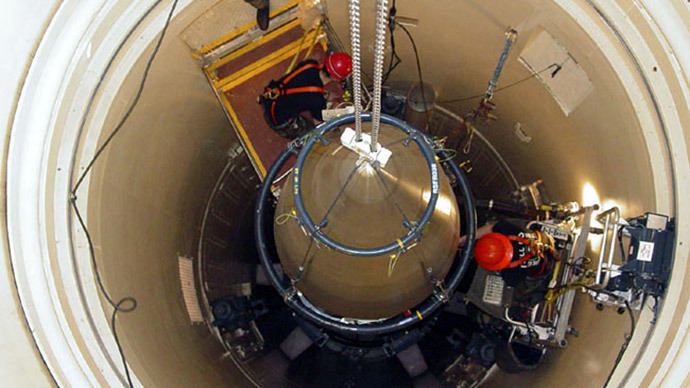‘Not practical’: US shrugs off calls to immediately eliminate all nukes

At a major international conference aimed at ending dependence on some 16,300 nuclear weapons, the US representative rejected the motion, declaring the United States prefers to take a gradual approach.
At a major international conference aimed at ending dependence on some 16,300 nuclear weapons, the US representative rejected the motion, declaring the United States prefers to take a gradual approach.
READ MORE:Preemptive nuclear strike omitted from Russia’s new military doctrine - reports
Some 800 representatives from 160 countries and non-governmental organizations assembled in Vienna on Tuesday for a conference devoted to the proliferation of nuclear weapons and the risk of a global accident. The lofty goals of the participants were dragged down somewhat after US representative Adam Scheinman said the plan was not “the most practical solution.”
“We think the most practical and realistic approach is to pursue reductions step by step,” said Scheinman, special US representative for nuclear nonproliferation, as quoted by AFP.
“As security conditions permit, we can move to still deeper reductions, as President Obama has committed to. But the idea of moving automatically to a treaty that would immediately eliminate all nuclear weapons is probably not the most practical option,” he said.
The Vienna conference was the third of its kind, and the first one attended by the United States – the only country to have ever used nuclear weapons when it dropped two atom bombs on the Japanese industrial cities of Hiroshima (August 6, 1945) and Nagasaki three days later.
Several nuclear-armed countries however did not attend the conference, including France, Russia and China.
Of the 16,300 nuclear weapons on the planet, 90 percent of them belong to US and Russian stockpiles. Of this number, 1,800 nuclear weapons are on “high alert” and ready for immediate use, according to the Bulletin of Atomic Scientists, as cited by AFP.
READ MORE:Feds say cleaning up most contaminated nuclear weapons site in US is too costly
The number of nuclear weapons, while still high, has dramatically fallen due to bilateral treaties forged between the two former Cold War foes.
Russia and the US, following promising efforts to reduce their nuclear stockpiles as prescribed by the 2011 New START treaty, have failed to further slash stockpiles, largely due to Russia’s wariness of US plans to construct a missile defense system in Eastern Europe – without Russia’s cooperation.
Moscow has warned that unless the issue is resolved, another arms race on the continent would occur.












